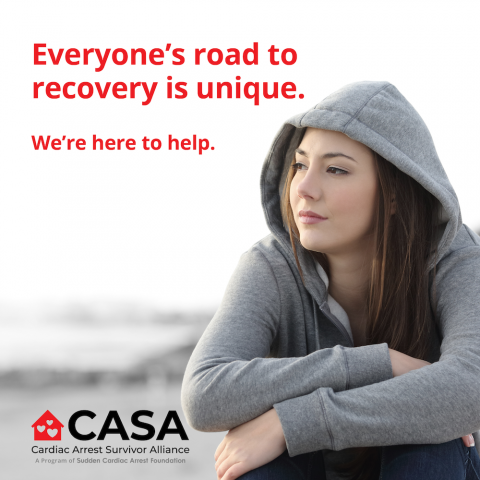
PITTSBURGH, PA -- Sudden Cardiac Arrest (SCA) survivors and loved ones are finding information, resources, and support through the Sudden Cardiac Arrest Foundation's Cardiac Arrest Survivor Alliance (tm). SCA is a leading cause of death in community settings across the U.S., affecting about 1,000 people every day. While only about 10 percent of victims survive, the number of survivors has grown slightly over the years, due in part to immediate help by people nearby who call 911, give CPR, and use automated external defibrillators (AEDs).
Experts have come to recognize that physical survival is just the first step. Many survivors and loved ones face psychological and emotional issues post-survival that can persist for years. As a result, there has been an increased emphasis on post-survival recovery.
To address this need, the Sudden Cardiac Arrest Foundation established the Cardiac Arrest Survivor Alliance, an online community for people affected by cardiac arrest, including survivors, loved ones, lay rescuers, and advocates.
“Our goal is to create a safe, welcoming space for anyone touched by cardiac arrest and support them in their post-survival journeys,” said Mary Newman, MS, SCAF president. “Thanks to collaboration among our leadership team members, we are able to provide information, resources, peer support, and access to experts to help community members recover, re-engage, and thrive.”
The leadership team includes healthcare professionals and those who have been personally affected by cardiac arrest. The community continues to grow and now has well over a thousand members from the U.S. and 24 other countries.
Community members are highly engaged and have offered comments such as:
- “Until this app came along, I had no one to talk with that understood. Now I feel less alone.”
- “We appreciate the webinars and information that has been shared with us, which until now has been unknown to us.”
- “I’ve made some great friends and have been able to share with others who have experienced SCA.”
“It’s become abundantly clear that both survivors and co-survivors need emotional support, in-hospital and post-discharge,” said Alex Presciutti, PhD, MSCS, Harvard University, a member of the CASA leadership team. “Importantly, however, support needs can differ depending on time since the initial event, as well as between survivors and co-survivors. Programs like CASA can fill these needs through its vibrant community of survivors and co-survivors across both ends of the survivorship spectrum who are ready to provide peer-to-peer connection, as well as having access to physicians and other healthcare professionals dedicated to improving survivorship.”
For more information, visit: https://casahearts.org.
